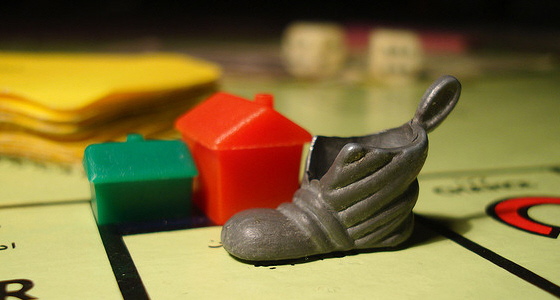
Together with the turkey, tangerines and Tom Smith’s crackers no Christmas in our house is complete without board games. It’s a family tradition. Every year, without fail, the same two boxes are retrieved from the cupboard under the stairs to be carried, with a certain amount of ceremony, to the dining room table. As they are placed before a group of festive-spirited folk an agonising decision has to be made: which shall we play first? One will see us cast as property tycoons intent on making money, while the other finds us playing detective at a country house as we attempt to solve a murder. Feelings always run high with everyone having their favourite, but to avoid any argument – this being the season of goodwill – we toss a coin to determine whether the Christmas games challenge is to begin with Monopoly or Cluedo.
Once the dices roll and the counters start inching their way around the familiar, slightly worn boards everyone becomes engrossed in the unfolding action and the competition is intense. Monopoly is all about becoming the wealthiest player by buying up the properties, railway stations or utilities on the board and charging rent to any opponent who subsequently lands on them. Properties are arranged in coloured groups and once a player has bought all of a particular colour he can begin building houses and then hotels. Although a player has to pay to develop his site, it means that he will be able to collect a much higher rent and make more money.
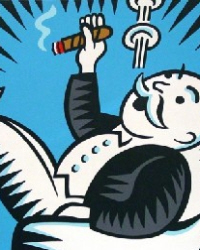 During the course of the game, players encounter some of life’s horrors such as income tax and imprisonment, but there are also occasional surprises such as windfalls and rewards. The good or bad news is spelt out on certain squares, or on the Chance and Community Chest cards placed in the centre of the board. You might inherit £100 or have to pay for repairs to all of your houses and hotels. Every player starts off with £1,500 and collects a further £200 when they pass the square marked “Go”. Should times become hard then there is the option of mortgaging property in an attempt to keep the wolf from the door.
During the course of the game, players encounter some of life’s horrors such as income tax and imprisonment, but there are also occasional surprises such as windfalls and rewards. The good or bad news is spelt out on certain squares, or on the Chance and Community Chest cards placed in the centre of the board. You might inherit £100 or have to pay for repairs to all of your houses and hotels. Every player starts off with £1,500 and collects a further £200 when they pass the square marked “Go”. Should times become hard then there is the option of mortgaging property in an attempt to keep the wolf from the door.
The opportunity to “play” with money is undoubtedly part of Monopoly’s appeal, but there is also an irresistible quality about the brightly coloured board and the reassuring old-fashioned appearance of the Chance, Community Chest and Title Deed cards. The six playing pieces have an individual charm about them too. These have changed over the years, but among the best remembered are the top hat, sports car, thimble, dog, boot and iron. Deciding which counter everyone is going to use is a hotly contested issue in our family – it’s as if each token brings with it an impending sense of victory or defeat.
Whether you emerge wealthy or bankrupt from Monopoly it’s guaranteed to keep you entertained even if it does have a reputation for being a somewhat lengthy pastime! I can recall games that began one day and were concluded the next. The world record for the longest game of Monopoly currently stands at 70 days, but to avoid such marathons most people now set a time limit before the discs start rolling.
An American salesman, Charles B. Darrow from Germantown, Pennsylvania, is credited with devising Monopoly, but as with many inventions this claim has been disputed. Following the loss of his job in the Wall Street Crash he created a property selling game, based on street names from Atlantic City in New Jersey. It became very popular and Charles began producing copies to sell, but couldn’t keep up with demand. In 1935, after securing a patent, he sold the rights to the games manufacturer Parker Brothers. The company had rejected an earlier approach from Darrow because they considered the game too complicated.
While it is certain that Charles Darrow developed Monopoly into the game we know today, it seems that it was based on “The Landlord’s Game”, which was the brainchild of another American, Elizabeth Magie Phillips. She obtained a patent in 1904, but the game wasn’t published in America until 1910. Three years later it became available in Britain under the very different name of “Brer Fox and Brer Rabbit”.
Once Parker Brothers had bought Monopoly from Charles Darrow, they approached Elizabeth offering to buy her patent for “The Landlord’s Game” for $500. She agreed, on the understanding that they would produce and sell three games she had devised including “The Landlord’s Game”. Unfortunately Elizabeth’s original game failed to make an impact and Monopoly emerged as the winner making Charles Darrow a millionaire in the process.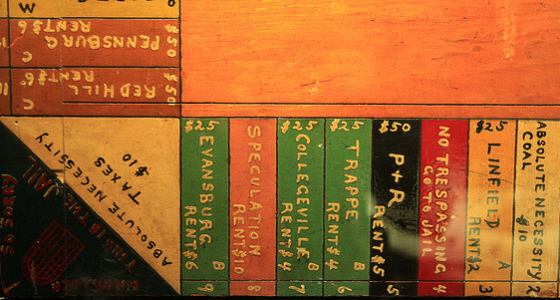
Monopoly has become one of the most successful board games in the world and to date 26 different language versions have been produced in 80 countries. New editions based on numerous towns and cities have also enhanced its popularity. For some of us though nothing beats the traditional British version. The game first came to Britain in 1935 when Parker Brothers sent a copy to the Managing Director of Waddington’s, Victor Watson. Victor’s son Norman tested the game and liked it, but he felt that if it were to realise its full potential this side of the Atlantic it would have to be set in London. Waddington’s then secured a licence to manufacture and market Monopoly in Europe and the Commonwealth with the exception of Canada.
The important job of choosing places to include on the British board was undertaken by Victor Watson and his secretary, Marjory Phillips. Ask anyone who’s played the game and the chances are they will remember most of the sites ranging from Old Kent Road priced at just £60, to the prestigious Mayfair at £400. In between there are well-known locations including Pall Mall, Whitehall, Fleet Street, Trafalgar Square, The Strand, Regent Street, Bond Street – not forgetting four railway stations, the electric company and the water works. The intriguingly named “The Angel, Islington” refers to an inn, which was later replaced by a Lyons Corner House, on the Great North Road. It is said that Victor and Marjorie used to meet here when they were seeking out potential locations and decided to feature it in the game.
It’s incredible to discover that Monopoly made a contribution to the war effort by helping British PoWs to escape. Waddington’s produced special versions containing maps ingeniously hidden underneath the boards. The games which were sent out to prison camps by the Red Cross, were also used to disguise compasses and real money. Wartime shortages inevitably affected the manufacture of Monopoly for the home market and any games made at this time had a spinner, to replace the two dice, and wooden, as opposed to metal, playing pieces.
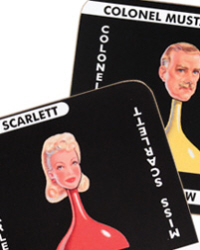 The conflict also meant that Waddington’s had to delay putting new games intro production and one of these was Cluedo, which works on the premise of the classic whodunit. It was dreamt up in 1943 by a fire warden while he was on duty in the city of Leeds. Anthony Pratt, a legal clerk originally from Birmingham, was inspired by the party game Murder in the Dark. His wife, Elva, was enthusiastic about the idea and designed a board representing the ground floor plan of a country mansion where a murder has taken place.
The conflict also meant that Waddington’s had to delay putting new games intro production and one of these was Cluedo, which works on the premise of the classic whodunit. It was dreamt up in 1943 by a fire warden while he was on duty in the city of Leeds. Anthony Pratt, a legal clerk originally from Birmingham, was inspired by the party game Murder in the Dark. His wife, Elva, was enthusiastic about the idea and designed a board representing the ground floor plan of a country mansion where a murder has taken place.
The victim is Dr. Black and the object of the game is to find out the murderer, the weapon and whereabouts the crime was committed. Cards depicting the suspects, weapons and rooms are dealt out to players and, by eliminating those held by their opponents, a player must solve the crime by identifying the suspect, weapon and room cards which have been carefully hidden in the black envelope at the centre of the board.
Players are coloured counters symbolising Cluedo’s six suspects: Colonel Mustard, Mrs. Peacock, Mrs. White, Miss Scarlet, Professor Plum and Reverent Green to move around the mansion, and miniature weapons – a rope, spanner, candlestick, dagger, revolver and a piece of lead piping – are placed in various rooms. Once a player makes their way into a room they can ask their opponents if they have certain cards and if they do, the person, weapon or room revealed on the card can be eliminated from the enquiry.
Anthony Pratt named his creation “Murder” and in 1944 he applied for a patent, which was granted three years later. In the meantime he and his wife approached Waddington’s to see if the company were interested in producing the game. Initial designs featured nine weapons including a bomb, axe, poison, hypodermic syringe and a poker. In addition there were the original suspects and among them was Dr. Black because it was intended that there would be a different victim each time. The board itself also included a gunroom.
Waddington’s were keen on the new game and once the patent was granted, and certain modifications had been made, they agreed to manufacture it as Cluedo. The name was derived from linking “clue” to “ludo”, which is Latin for “I play”. The effects of the war meant that Cluedo wasn’t launched until 1949, but with the public’s appetite for detective fiction it was clear that it was going to do well. Parker Brothers snapped up the rights for the American market where it is known as Clue and Dr. Black is Mr. Boddy! Rather surprisingly it caught on much quicker in America than it did in Britain. Today, Cluedo is played in more than 40 countries and is one of the top ten board games in the world. Amazingly it has prompted a film, musical and television programmes.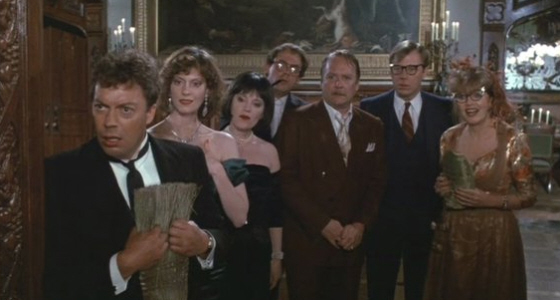
Despite the ultimate success of Cluedo Anthony Pratt wasn’t rewarded with immense riches or fame. He received royalties on British sales for a limited period then sold his rights to Waddington’s in 1953 for a one-off payment. Nevertheless this did enable him to pursue his dream of becoming a concert pianist.
Waddington’s eventually lost all contact with Cluedo’s creator, but when sales edged towards 150 million copies in 1996 they tried to trace him. Sadly, they were too late. The man who kept families entertained with the ultimate murder mystery had died two years earlier at the age of 90. Laid to rest in Bromsgrove cemetery, in Worcestershire, his headstone accords him due recognition of “Inventor of Cluedo”.
Since Monopoly and Cluedo first appeared on toy-shop shelves technology has influenced children’s expectations regarding the way that games are presented. The toy company Hasbro now owns Waddington’s and Parker Brothers and it continues to produce and develop new formats of these two favourite board games.
© Words - Angeline WilcoxUsed Kind permission of "This England" magazine





